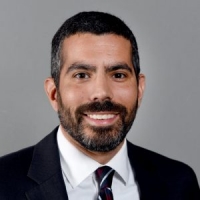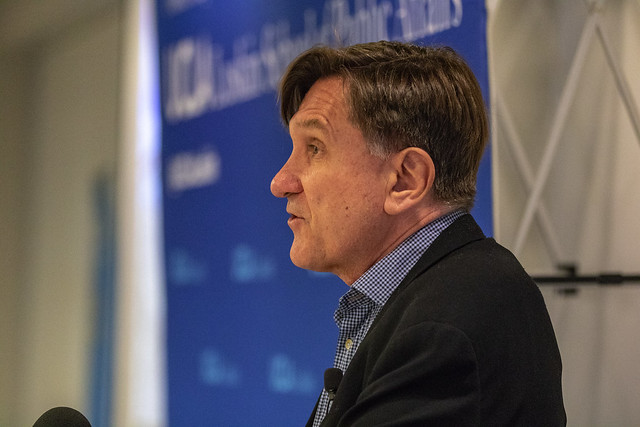A Time of Transition
By Les Dunseith
What’s new, you ask?
- There’s a new dean.
- Two new master’s degrees are working their way through the faculty approval process.
- Next fall, three of four department chairs will be new in the role, and one of them is new to UCLA.
- One of our prestigious academic research centers has a new faculty director.
- We have several new or almost-new staff members, including two whose jobs focus on alumni.
- Newly renovated public areas are now open in the Public Affairs Building after the completion of an 18-month seismic retrofit.
- And, as you may have heard, a historic 40-day strike ended with a new labor agreement that will boost the pay of graduate student workers and postdocs at all 10 University of California campuses.
In this story, we delve into these changes in detail, starting with a familiar face in a new role — Interim Dean Anastasia Loukaitou-Sideris. (Note that each subhead below links to other, often-more-detailed content online, including some photos.)
On Jan. 1, Loukaitou-Sideris took over for Professor Gary Segura, who chose to step down as dean after six years to focus on his teaching and research. Loukaitou-Sideris is a longtime distinguished professor of urban planning who had served as associate dean for 12 years. She will lead the Luskin School for at least two-and-a-half years, while a permanent dean is being sought.
A widely published scholar who joined the UCLA faculty in 1990, Loukaitou-Sideris helped lead a strategic planning effort to redefine the future of the School after Meyer and Renee Luskin’s naming gift in 2004. She later drew on that experience to lead a campuswide task force to create UCLA’s strategic plan.
After 33 years at UCLA, Loukaitou-Sideris felt comfortable diving right in as dean.
“I love the School,” she said shortly after moving into the dean’s office. “I know the School inside and out, and I have served the university in different capacities. I know the deans. I know the vice chancellors. There is an element of familiarity. And I feel that I’m giving something back to a School that has been extremely good to me all these years.”
Loukaitou-Sideris doesn’t plan to simply be a caretaker. “I’m going to continue some activities, and start new initiatives,” she said. “I feel I owe it to the School and its people.”
The foundation of the Luskin School with its unique integration of public policy, social welfare and urban planning remains strong, she said. “The common thread is social justice and a desire to make cities and society better — to improve things.”
She plans to build on the successes of her predecessor, who increased the footprint and reputation of the Luskin School. Segura also successfully advanced student and faculty diversity. Women and people of color now constitute roughly half of UCLA Luskin’s full-time and ladder faculty.
The number of research grants has also grown substantially, and the Luskin School expects to exceed last fiscal year’s record total of more than $20 million in extramural research grants and contracts.
“All of this is very, very good,” Loukaitou- Sideris said. “We have reached a level of stability now.”
Loukaitou-Sideris hopes to bring to fruition efforts initiated by previous deans to create two additional master’s degrees.
The UCLA Graduate Council gave a thumbs-up in mid-April for a Master of Real Estate Development, or MRED, degree. Pending further reviews, including approval by the University of California Office of the President and the UC Regents, the first cohort would likely enroll in fall 2025.
Led by Vinit Mukhija, a professor and former chair of urban planning, the program is envisioned as a one-year, full-time, self-supporting degree program in which enrollment is matched to costs.
Documentation for the new degree stresses instruction on the ethical underpinnings of a growing profession and the training of real estate developers to have a social conscience. Coursework would be led by faculty experts from UCLA Urban Planning, the Anderson School of Management and UCLA Law.
The second new degree, a Master of Global Public Affairs, is envisioned as an interdepartmental degree providing intellectual preparation to future experts who plan to work within the realm of global public affairs. The program description is being developed by Professor Michael Storper and lecturer Steve Commins, members of the urban planning faculty who have led UCLA’s Global Public Affairs certificate program since its inception in 2015.
“We need to educate global citizens,” Loukaitou-Sideris said.
In the discussion stage of development is a third initiative — a new revenue-producing certificate program around e-governance and the impact of emerging technologies.
Loukaitou-Sideris hopes to create an opportunity for working professionals, including alumni, to pursue coursework at UCLA that would help them stay current in an era of rapidly changing technology.
Helping to guide the future of the Luskin School will be three new department chairs for the 2023-24 academic year:
- Professor Michael Lens will become the new chair of the undergraduate major, succeeding Meredith Phillips, who since 2018 successfully built from scratch the Bachelor of Arts in Public Affairs.
- Professor Michael Manville will become the new chair of Urban Planning, following a three-year term by Professor Chris Tilly.
- Professor Laura Abrams will remain as a department chair for one additional year, extending to seven years a term as leader of Social Welfare that began in the summer of 2017.
- After a year as interim department chair of Public Policy, Mark Peterson will step aside for a new chair, Robert Fairlie, who will move to UCLA this summer from the University of California Santa Cruz.
Fairlie was a professor of economics at UC Santa Cruz and is a member of the National Bureau of Economic Research. Areas of his research, published in leading economic and policy-related journals, include public policy, entrepreneurship, education, racial and gender inequality, information technology, labor economics, developing countries and immigration.
He has strong ties to the state, arriving in California at age 2 and growing up near San Jose. He attended Stanford University, earning a bachelor’s in economics. He previously held visiting academic positions at Stanford and UC Berkeley. He also serves on the Faculty Council of the UC Sacramento Center.
A new book on entrepreneurial job creation and survival — seven years in the making — will soon be published with MIT Press. Fairlie and his co-authors at the U.S. Census Bureau created a new dataset to track the universe of startups in the country — the Comprehensive Startup Panel, or CSP.
“We find that startups, on average, create fewer jobs and have lower survival rates than previously documented,” Fairlie said.
Fairlie is the second professor recently hired into a leadership position in UCLA Luskin Public Policy.
Megan Mullin also joined UCLA Luskin, as both a professor and the new faculty director of the Luskin Center for Innovation. Formerly a professor at Duke University, Mullin has been getting to know the people and programs at UCLA since her arrival in January.
“I had an idea of what the center was doing. It impressed me, and everything I’ve learned in the last months has assured me that my impression was correct,” said Mullin about the center and the strength of its work. “The people doing it are so committed to the mission of bringing good research and good analytics to responsible environmental decision-making,” she said. “It’s really exciting to see.”
Mullin is a scholar of American political institutions and behavior, with a focus on environmental politics. In addition to her center appointment, she is also the Meyer and Renee Luskin Endowed Professor of Innovation and Sustainability in the department of Public Policy.
In spring quarter, Mullin taught an undergraduate course in U.S. environmental politics designed to help “students gain competency in identifying political opportunities for advancing environmental policy goals,” she said.
Her arrival happened to coincide with one of California’s rainiest seasons to date, and Mullin said the growing uncertainties surrounding the impact of climate change will persist as a concern in California and the country.
Mullin cited risks associated with overabundance, including rainfall, and cautioned about complacency and thinking that California’s drought is over thanks to winter rains, “because it’s not.” Managing water resources and water accessibility are problems during both severe storms and drought, she said, particularly as it relates to what happens to floodwater.
She wrote a recent article in Nature on why Americans have been slow to respond to the climate crisis. “It is time to bring political knowledge to bear on decisions about protecting people from its consequences,” Mullin wrote.
“And so that’s going to be part of the portfolio for the center going forward, too.”
NEW STAFF WITH AN ALUMNI FOCUS
This academic year started with Karina Mascorro, Ph.D. as the School’s new alumni engagement director. She works with the departments to manage and promote alumni-related activities such as the regional alumni receptions that have resumed after the pandemic.
“I am responsible for ensuring that we catch every opportunity to highlight the outstanding accomplishments of our alumni,” Mascorro wrote in an email to staff and faculty last fall.
In March, the Luskin School added another staff member with an alumni-related role, Vishal Hira, who will oversee the annual giving program as associate director of development for the School.
After making the building safer in the event of a major earthquake, construction crews have departed the Public Affairs Building.
The project also involved refurbishing the notoriously unreliable elevators, and all four have been upgraded. Restrooms were modernized with an eye toward sustainability and inclusivity — non-gendered options are now available. And some shared-use areas, including a lounge on the 5th floor with cooking appliances, have been remodeled.
There’s been plenty of upbeat news, but the path ahead has also been complicated by what Loukaitou-Sideris refers to as a “triple whammy” — the aftereffects of the COVID-19 pandemic, the UC strike and the unexpected resignation of a dean.
“Morale is very important, as you know, in an organization,” Loukaitou-Sideris said.
She’s a believer in open communication and transparency, so she began her tenure by immediately hosting a town hall with faculty and staff, and another with students. Loukaitou-Sideris spoke frankly about some of the challenges ahead.
With inflation spiking in the wake of the pandemic and a continued decline in the percentage of operating costs in higher education being funded by the state, a time of budget austerity looms.
One hurdle relates to the increased labor costs resulting from the strike settlement agreement. Unless the state and University of California Office of the President unexpectedly shift money to individual units, it appears that it will be up to the faculty and staff leaders to find the necessary dollars to pay the higher wages of student workers and other union-represented employees at the Luskin School.
Some trims in budget areas controlled by the dean have been made, with more likely to follow. And staff who leave UCLA for another job or retire may not be replaced, with remaining staffers’ duties likely changing as a result.
Already, two associate dean positions have been combined into one, with Professor David Cohen adding responsibilities that he formerly shared with Loukaitou-Sideris. Her other former duties have been parceled out to staff members in the dean’s office or the departments.
Loukaitou-Sideris said departments have been asked to share more of their funds with the dean’s office for one year, “and then we will reevaluate once we have a better sense of the overall budget situation at UCLA and [the University of California].”
So far, she said, everyone has been responsive, understanding that reducing the budget is a collective effort.


